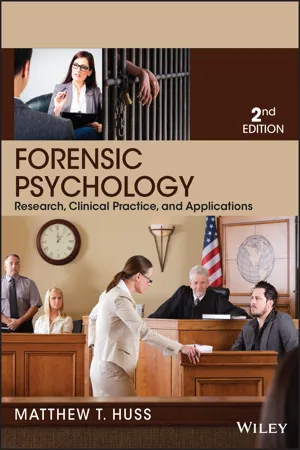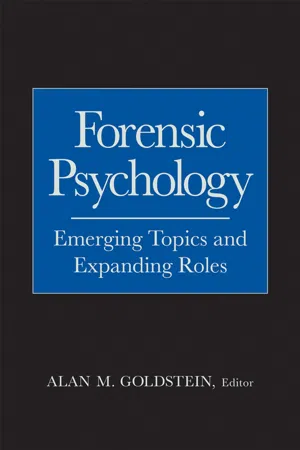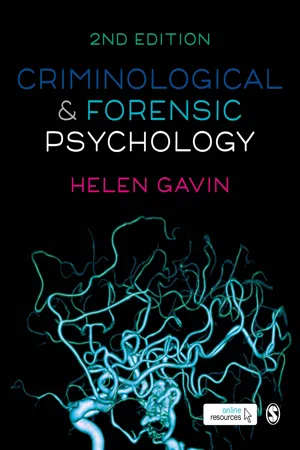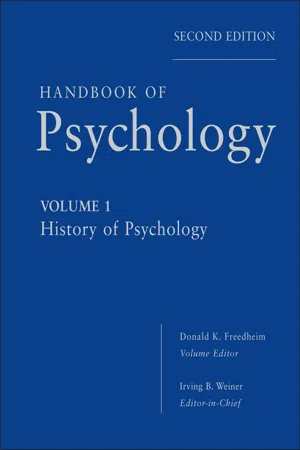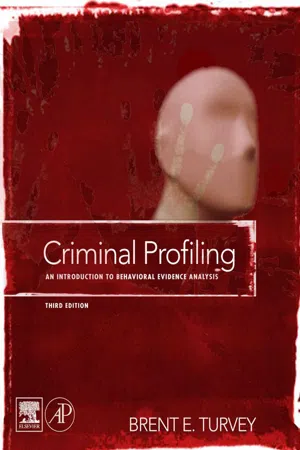Psychology
Forensic Psychology
Forensic psychology is the intersection of psychology and the legal system. It involves applying psychological principles to understand and address legal issues, such as criminal behavior, mental competency, and the impact of trauma on victims and witnesses. Forensic psychologists may work in various settings, including courts, correctional facilities, and law enforcement agencies, providing assessments, expert testimony, and therapeutic interventions.
Written by Perlego with AI-assistance
Related key terms
1 of 5
7 Key excerpts on "Forensic Psychology"
- eBook - PDF
- Matthew T. Huss(Author)
- 2013(Publication Date)
- Wiley(Publisher)
Chapter 1 What Is Forensic Psychology? An Introduction 5 (e.g., Huss & Gonsalves, 2009).This narrower definition of Forensic Psychology excludes topics such as eyewitness identification (cognitive psychology), polygraphs (physiological psychology), jury behavior (social psychology), and the testimony of children in court (developmental psychology). These other nonclinical aspects have a powerful impact on the legal system and are extremely important in the psychological study of the law, but they are beyond the scope of the current text. Students should check other sources if they have interest in these aspects of psychology and the law (e.g., Brewer & Williams, 2005; Costanzo & Krauss, 2012; Greene & Heilbrun, 2010; Weiner & Hess, 2006). We will focus on the aforementioned narrow definition of Forensic Psychology in this book, concentrating solely on the practice of clinical psychology and its intersec- tion with the law.The clinical practice of psychology generally focuses on the assessment and treatment of individuals within a legal context and includes concepts such as psy- chopathy, insanity, risk assessment, personal injury, and civil commitment (Huss, 2001a, 2001b). Furthermore, we will generally avoid topics that are more characteristic of police psychology (criminal profiling, fitness for duty evaluations, hostage negotiation) or correctional psychology that focuses on issues pertinent to correctional facilities (prisons and jails) but that do not lead to assisting the courts directly. In using this definition of Forensic Psychology, we must also differentiate the practice of Forensic Psychology from forensic psychiatry. Clinical and counseling psychologists are often confused with psychiatrists. Although both psychologists and psychiatrists are trained to assist individuals with mental illness and emotional difficulties in general, there are significant differences (Grisso, 1993). Psychiatrists are medical doctors and obtain MDs or DOs. - eBook - PDF
Forensic Psychology
Emerging Topics and Expanding Roles
- Alan M. Goldstein(Author)
- 2006(Publication Date)
- Wiley(Publisher)
(p. 6) The definition of this expanding area of practice proposed by this author (A. M. Goldstein, 2003a) in Forensic Psychology, Volume 11 of the Handbook of Psychology (I. B. Weiner, 2003), proposes that Forensic Psychology “involves the application of psychological research, theory, practice, and traditional and specialized methodol- ogy (e.g., interviewing, psychological testing, forensic assessment and forensically relevant instruments) to provide information relevant to a legal question” (p. 4). Forensic psychologists may conduct research on topics related to the civil and criminal legal systems or may focus on specific questions that these institutions of justice consider; such findings may take the form of expert testimony, whose goal is to educate a jury or judge about a specific legally relevant topic (i.e., issues related to eyewitness identification; factors that may contribute to false confessions). Those in the practice of Forensic Psychology typically conduct individual assess- ments of defendants, plaintiffs, or parents involved in child custody cases; the prod- uct of these evaluations has a similar goal: to educate jurors and judges by providing them with information they may not otherwise have known when they consider making a legal determination (i.e., the impact of mental retardation or mental illness on the ability of a defendant to assist an attorney in defending the client in court; the possible role that duress or coercion may have played in a defen- dant’s involvement in a criminal act to be considered by a federal judge at the time of sentencing; the effects of Alzheimer’s disease on a patient’s ability to make an informed decision about consenting to or refusing medical treatment). The chapters in this book reflect the perspective that an element of the evolving standard of care - eBook - PDF
The Therapized Antisemite
The Myth of Psychology and the Evasion of Responsibility
- Christopher L. Schilling(Author)
- 2024(Publication Date)
- De Gruyter(Publisher)
Chapter V Forensic Psychology The American Psychological Association (APA) defines Forensic Psychology as “the application of clinical specialties to the legal arena.” 335 Therefore, “the practice of Forensic Psychology, and perhaps the most frequent duty of forensic psycholo- gists,” according to the APA, “is the psychological assessment of individuals who are involved, in one way or another, with the legal system.” 336 Forensic psychol- ogy plays a role in treatment, trial consultations, and research, but most salient here is its assisting law enforcement with criminal profiling and court testimony. Criminal Profiling Would psychology help to profile an antisemitic criminal? Despite its popularity in TV shows, movies, true crime podcasts, and the like, compared to untrained indi- viduals, criminal profilers hardly do any better. 337 In one study, they did worse than chemistry majors. 338 The reason why so many still believe there to be any scientific justification for psychological criminal profiling is due mostly the P. T. Barnum Ef- fect 339 – the tendency to see general and vague personality descriptions as believ- able. 340 What becomes apparent is that their work is more horoscope than science. “Most profilers sprinkle their predictions liberally with assertions that are so nebu- lous as to be virtually untestable,” write Scott O. Lilienfeld et al., “(‘The killer has unresolved self-esteem problems’), so general that they apply to just about everyone (‘The killer has conflicts with his family’), or that rely on base rate information about most crimes (‘The killer probably abandoned the body in or near a body of water’).” 341 In turn criminal profilers are seen as accurate because many of their https://www.apa.org/ed/precollege/psn/2013/09/forensic-psychology. Accessed August 23, 2023. https://www.apa.org/ed/precollege/psn/2013/09/forensic-psychology. Accessed August 23, 2023. R. J. Homant and D. B. - No longer available |Learn more
- Helen Gavin(Author)
- 2018(Publication Date)
- SAGE Publications Ltd(Publisher)
There are various specialisms within the broad field of psychology, and Forensic Psychology is one of them, and, if the use of it in drama is anything to go by, one of the more fascinating. The word ‘forensic’ is from the Latin term forensis, meaning ‘of the forum’, because Ancient Rome’s forum was where the law courts were held. We now refer to forensic sciences as the application of scientific principles to the adversarial law process. Forensic Psychology is the application of psychology to the legal process. Criminological psychology is an approach to studying crime that provides a critical evaluation the core areas of Forensic Psychology, criminology, victimology, and psychology in the criminal justice system. Where does such terminology leave Forensic Psychology? Forensic Psychology is strictly the term describing the application of psychology to the legal process, and it has a long, long history. It holds a special relationship to other fields of study, such as criminology, law, and medicine, and the ways in which those relationships influence research and practice culminate in a growing understanding of crime. History of the Use of Psychology in the Study, Investigation, and Punishment of Crime The relationship between psychology and the legal system is an ancient one. The Greek philosopher Aristotle stated, in his books Nicomachean Ethics, written around 340 bc, that a person should only be considered morally responsible for a criminal act if he has knowledge of the circumstances and acted without external compulsion. Hence a crime is only punishable if the character of the offender is under his own control (Pakaluk, 2005). A seemingly enlightened view for more than 23 centuries ago, such philosophical positions took many years to be incorporated into any form of legal system, and this history is littered with what to modern eyes appears to be injustice - eBook - ePub
- (Author)
- 2012(Publication Date)
- Wiley(Publisher)
The conference participants also noted that it would be especially helpful if additional opportunities were provided for students to obtain appropriate real-life experience in legislative, administrative, and judicial settings. It has been asserted that the competent psycholegal scholar must be “trilingual,” familiar with scientific psychology, the law, and the psychology-law interface. This would seem to be a most challenging training situation (e.g., see Bersoff et al., 1997).During the first decade of the 21st century, about 40 years after the modern field of Forensic Psychology had begun, the American Psychological Association recognized Forensic Psychology as a professional specialty. In addition to providing an “official” definition of Forensic Psychology (see the first section of this chapter), the APA offered the following description of the knowledge domain for the practice of Forensic Psychology:- Clinical (e.g., diagnosis, treatment, psychological testing, prediction and intervention measurement, epidemiology of mental disorders, ethics)
- Forensic (e.g., response style, forensic ethics, tools and techniques for assessing symptoms and capacities relevant to legal questions)
- Legal (e.g., knowledge of law and the legal system, knowledge of where and how to obtain relevant legal information) (www.apa.org/ed/graduate/specialize/forensic ).
Subsequent to APA's identification of Forensic Psychology as a practice specialty, Packer and Grisso (2011) provided a comprehensive description of the specialty. Explaining how the practice of Forensic Psychology differs from other specialties in psychology, they described the knowledge domain of the field in somewhat more detail as requiring: - eBook - PDF
Introduction to Clinical Psychology
Bridging Science and Practice
- Douglas A. Bernstein, Bethany A. Teachman, Bunmi O. Olatunji, Scott O. Lilienfeld(Authors)
- 2020(Publication Date)
- Cambridge University Press(Publisher)
Psychologists with expertise in law enforcement may also be involved in criminal profiling, a practice that seeks to help find the perpetrator of especially heinous or serial crimes. The scientific evidence for the accuracy of criminal profiling is feeble. Psychologists may conduct evaluations in worker’s compensation and other employment- related cases. They are also involved in the assess- ment of returning war veterans’ posttraumatic stress disorder (PTSD) and cognitive impairments that can affect these veterans’ ability to return to duty and/or to receive benefits and treatment. Clinical psychologists who assess families in crisis continue to be in high demand. These psycholo- gists offer opinions about the fitness of separating or divorcing parents to retain custody of their chil- dren and whether joint custody, sole custody, or some other arrangement would be best for the children. Many clinicians are also involved in efforts to mediate, rather than litigate, custody battles. Some act as parenting coordinators who help divorced or separated parents agree on parenting issues. Although expert testimony by psychologists is common, some critics question its reliability, valid- ity, propriety, and usefulness. The reputation of psychological expert testimony may be enhanced by a variety of reforms, including setting standards for practice, enactment of procedural rules that govern the type and limits of expert testimony, and creation of registries of experts who will serve the court itself, not individual parties. 476 | Forensic Psychology - eBook - PDF
Criminal Profiling
An Introduction to Behavioral Evidence Analysis
- Brent E. Turvey(Author)
- 2011(Publication Date)
- Academic Press(Publisher)
With respect to profiling, this can occur when a profiler ascribes his or her own thoughts, feelings, or motives onto the behavior evident in a given case. CHAPTER 4 Forensic Psychology, Forensic Psychiatry, and Criminal Profiling 130 The forensic psychiatrist or psychologist has much to offer the developing field of behavioral profiling. He or she can bring a technically proficient aspect of the behavioral sciences to the professional table. Some, but not all, forensic psychiatrists and psychologists will make good behavioral profilers, just as some investigators and forensic scientists, but not all, will make good profilers. If one is willing to invest the necessary extra effort to educate oneself to the basic forensic sciences and investigative issues, the field of offender profiling has much to offer the forensic psychiatrist or psychologist and much to gain from his or her expertise. SUMMARY Forensic Psychology and psychiatry involve the application of the behavioral sciences to legal questions. Common psycholegal questions that forensic mental health professionals answer involve (1) risk for future sexual offense recidivism, (2) competency to stand trial, and (3) criminal responsibility/sanity at the time of the offense. In addition, forensic psychologists and psychiatrists, with their knowledge of human behavior, can add a unique perspective to ongoing investigations in the form of offender profiling. Forensic psychologists and psychiatrists are specific kinds of mental health pro-fessionals with set levels of education, patient contact, licensure, and certification. Not everyone who calls himself or herself a psychologist, or a forensic psychologist, in the profiling community can meet these standards. Those employing profilers should be particularly wary of those who cloak their advice with psychological garb to imply legitimacy, including so-called investigative psychologists and psychics.
Index pages curate the most relevant extracts from our library of academic textbooks. They’ve been created using an in-house natural language model (NLM), each adding context and meaning to key research topics.
